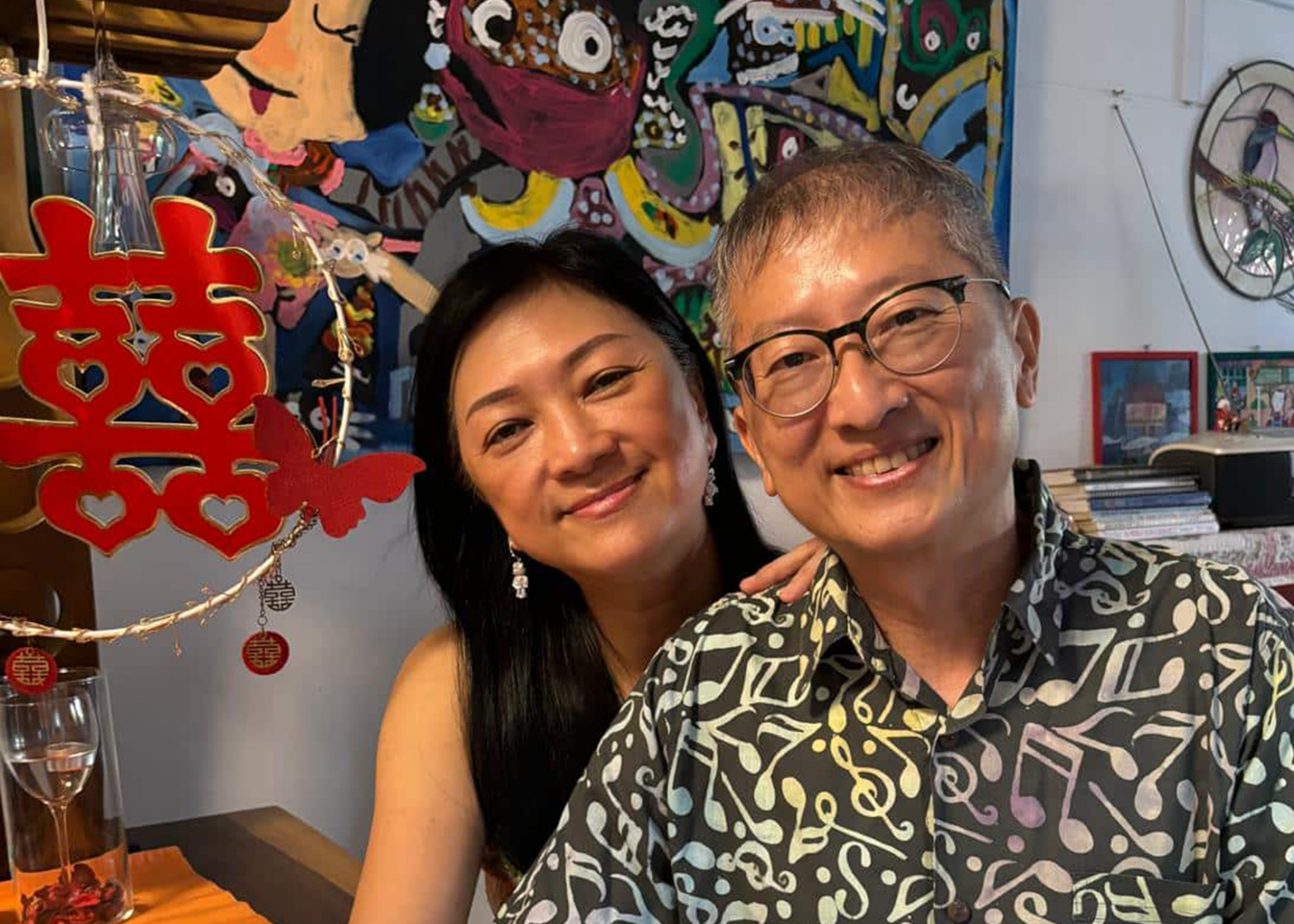“The nurse said, ‘So poor thing. So young.’ That’s when I cried”: Her aggressive cancer would lead her to journey with others
by Christine Leow // September 9, 2021, 11:42 am
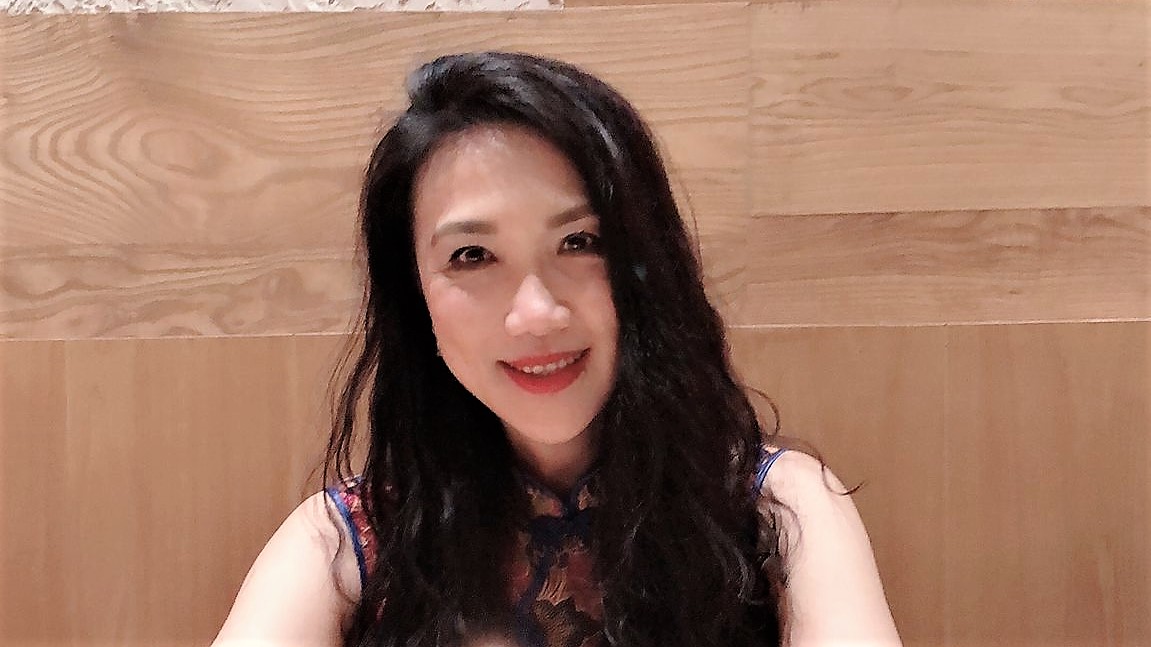
Cally Koh's long hair had always been her pride and joy. When she was diagnosed with breast cancer, she dreaded the hair loss more than she dreaded the treatments. Now, at 56, and in remission for two decades, her hair is still lustrous and naturally black. All photos courtesy of Cally Koh.
Cally Koh was only 31 when she was told she had triple-negative breast cancer, considered one of the most aggressive breast cancers with a poorer prognosis than the others.
Until then, she had been perfectly healthy. In fact, some seven months before, she had gone for a health screening and had been given the all-clear.
Said the 56-year-old: “At the health screening, the GP told me to do a self-check after my menses. I said, ‘Sure.’”
“The nurse said, ‘So poor thing. So young.’ It was then that I cried.”
It would be six months before Cally remembered to do so. When she did check, she discovered a lump.
“I have three sisters and when I asked them, ‘How?’, they said, ‘Never mind, women are all lumpy.’”
Cally consulted her GP who quickly referred her to a breast surgeon. A mammogram and an ultrasound later, she was told that “90% it is cancerous”.
“Mine was quite obvious. Cancer in the breast is quite easy to detect because it starts with calcification that looks like white dots. My white dots were all clustered together.
“The nurse said, ‘So poor thing. So young.’ It was then that I cried. That was the only time I cried.”
First brush with faith
To confirm the diagnosis, Cally underwent a biopsy. Before the procedure, her anaesthesiologist had a chat with her.
“He asked me, ‘Are you afraid?’ Then, he prayed for me. It was the first time someone had ever prayed for me.”
It was also her first encounter with the Christian faith.
The biopsy confirmed what the doctors had already strongly suspected. It was cancer. Only then did Cally break the news to her family.
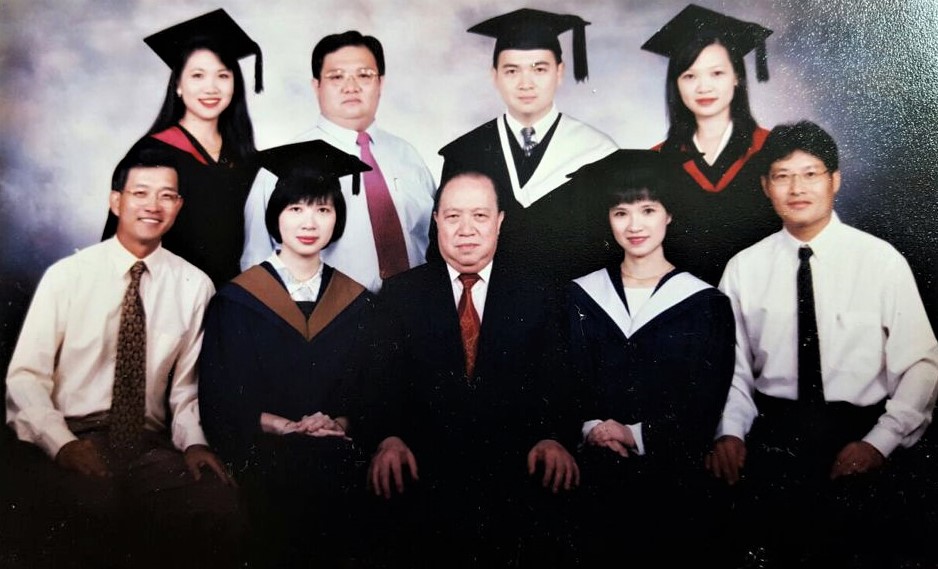
Cally (standing, left) with her siblings – three sisters and two brothers, and brothers-in-law – in 1995, a year before she was diagnosed with breast cancer.
“I laid out my plans, told them I’m going to do this next and then that. My youngest brother looked at me and asked, ‘How come you’re not sad?’ I said, ‘How is sadness going to help me?’
“Initially, I did ask, ‘Why me? I am young, I never ate unhealthy food.’
“But it was for a very short time. I accepted it quite quickly. I just went into solution mode.”
“He asked me, ‘Are you afraid?’ Then, he prayed for me.”
For Cally, that meant dressing up even if it was to go for treatments.
“If I look good, I feel good. And when I feel good, that’s how it helps me in my treatment.”
Cally had a lumpectomy during which 16 axillary lymph nodes were also removed. Six months of chemotherapy followed before she underwent 36 sessions of radiation. In all, treatment took nine months.
Of all the side effects – nausea, vomiting, mood swings, fatigue – the one that affected her the most was hair loss.
“My hair came down to my waist. When my oncologist, Dr Karmen Wong, told me about the hair loss, I said, ‘I don’t want to do it, I would rather die!’
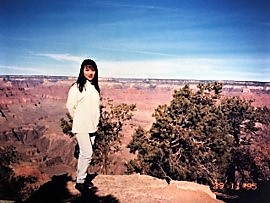
Cally on holiday in the US in 1995. When she knew she was going through treatment and would lose her hair, she admits asking God to save her locks so she can inspire other women in the same situation.
“I even spent S$300 to cut and colour my hair before my treatment. I thought: If I had to lose my hair, I must lose it in style.”
When, at first, strands of hair fell non-stop and then whole clumps fell after every shower, it was “super depressing”.
Called to a childlike faith
While going through chemotherapy, Cally continued life as normally as she could.
She kept her IT job. On one occasion, she had lunch with a colleague who had a cold. Her compromised immunity provided little protection and she caught the bug.
“I didn’t know it then but I guess it was the presence of God.”
“I developed a high fever – 41 to 42 degrees Celsius – for three days and three nights. On the fourth day, I went to my oncologist and she scolded me (for not coming in earlier) and got me hospitalised.
“My white blood count was so low, I could have died. In the ward, she prayed for me.”
Once more, her illness had opened a door to the Christian faith.
Cally lived to not only continue her treatment but also to get a new job as a headhunter.
A week into her new job, she was invited to an evangelistic musical in a church.
“I went out of boredom. The presentation was very good. I wasn’t brought up in a Christian school, so the Jesus story was very new to me. I thought, ‘Wah, so emo.’”
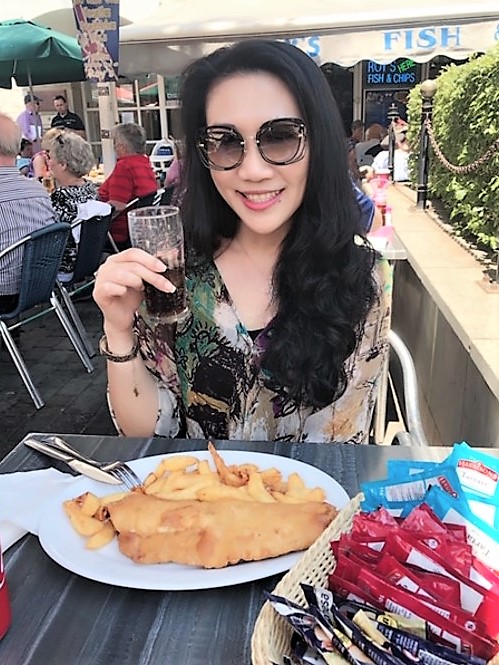
From the start, Cally was determined to focus on getting better and to live life as normally as possible, even while undergoing treatment.
Then came the invitation to receive Jesus as Lord and Saviour.
“By then, I had switched off,” Cally confessed.
While many went to the front to be prayed for, she remained in her seat. She never quite knew why but an usher approached her and asked if she, too, would like to go up front for prayers.
“I really thank God that He gave me childlike faith.”
“I didn’t know what to say, so I said, ‘Yes.’ I had just finished my chemotherapy and had asked God to bless me with complete healing.
“When they said the sinner’s prayer, I followed. I had no clue what that was. But then, I started crying. Really crying. I didn’t know it then but I guess it was the presence of God.
“Then, I met a colleague from my new office. She was a counsellor in the church. When she prayed for me, I cried some more.
“I really thank God that He gave me childlike faith.”
That was the start of her journey as a Christian. She went to church, joined a cell group and became involved in the worship ministry.
A changed life
Being a Christian changed Cally’s life in other ways.
“I had been in a relationship for about two years. It was a very stressful relationship because I couldn’t trust my boyfriend. He was not faithful and was dating other women.
“I would try to catch him in the act. I would check his voicemail and camp outside his house when he said he was overseas to see if it was true.”
“I had to learn to let go and let God.”
Though her boyfriend supported her throughout her diagnosis and treatment, and even became a Christian when Cally became one, he “never stopped his hanky panky”.
“I prayed about it for six months and God showed me (the way).”
Cally broke up with the man.
“I had to learn to let go and let God. I have always needed to control everything. I was so headstrong. I needed to be right all the time.
“I was trying to change my boyfriend. But he couldn’t be changed. I had to learn to let go of the control.”
A middle child in a family with six children, Cally lost her mother early.
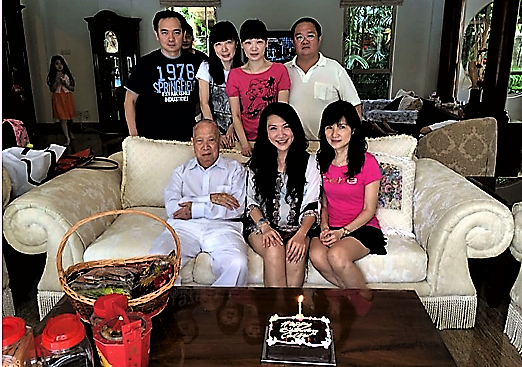
Cally (seated, centre) with her father (seated, left) and siblings. After becoming a Christian, she had a newfound confidence knowing the love of her heavenly Father.
“I didn’t grow up in a family where my father would say that he loved me or hugged me.
“He was more da shi teng (discipline is love). So, the insecurity in me was very strong.”
“I would lose my temper easily … Now, no more. I can forgive easily. Forget as well.”
When Cally became a Christian, she went for several healing room ministries.
“Someone prayed a father’s blessing over me and I cried. I was able to move from Jesus loves me unconditionally in my head to my heart.
“I experienced a breakthrough. I realised that all my confidence and security come from God.”
That realisation softened her heart and her manner.
“My oncologist who has since become my friend has known me for 25 years. She said, ‘My first impression of you, you were so self-absorbed, so young and aggressive and full of yourself.’
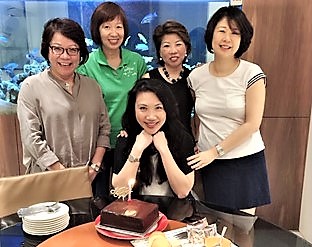
Cally (seated) celebrating her birthday with her oncologist and friend, Dr Karmen Wong (standing, left). They became friends when Dr Wong started treating Cally’s cancer 25 years ago.
“I’ve changed over the years. I used to be very impatient. I would lose my temper easily. When I lived with my brother, we would be at loggerheads a lot because we were both headstrong.
“Now, no more. I can forgive easily. Forget as well.”
A new mission
As Cally received healing for past hurts, she also discovered a deepening desire to help others with cancer.
“When I went through cancer, there was no one to help me, no support group. I know the journey is difficult.
“I tell them, ‘God wants us to be transformed to be more and more like Him.”
“I didn’t want the ladies to do it alone. Since I have been through it, I thought I could make their journey easier.”
There were no existing support groups then for cancer patients. So Cally asked her oncologist to introduce her to women who wanted someone to walk with them through their cancer journey.
“My first group, the women all had white hair. They were all older than me.”
When the Breast Cancer Foundation was established in 1997 more than a year after Cally’s diagnosis, she joined them as a befriender and advocate.
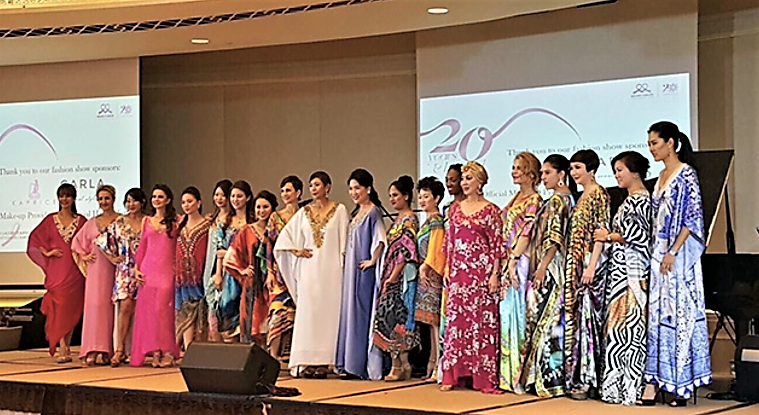
Cally (centre in lilac) at a Breast Cancer Foundation fundraiser. She is actively involved in the organisation.
Hospital visits, phone calls and house calls have since become part of Cally’s way of reaching out to the newly diagnosed, those who suffer relapses as well as those undergoing treatment.
“When I journey with them, I also speak to their husbands and children on how to support them through treatments.
“On their better days, I bake with them, go for walks, take them shopping, do a lot of fun things with them.”
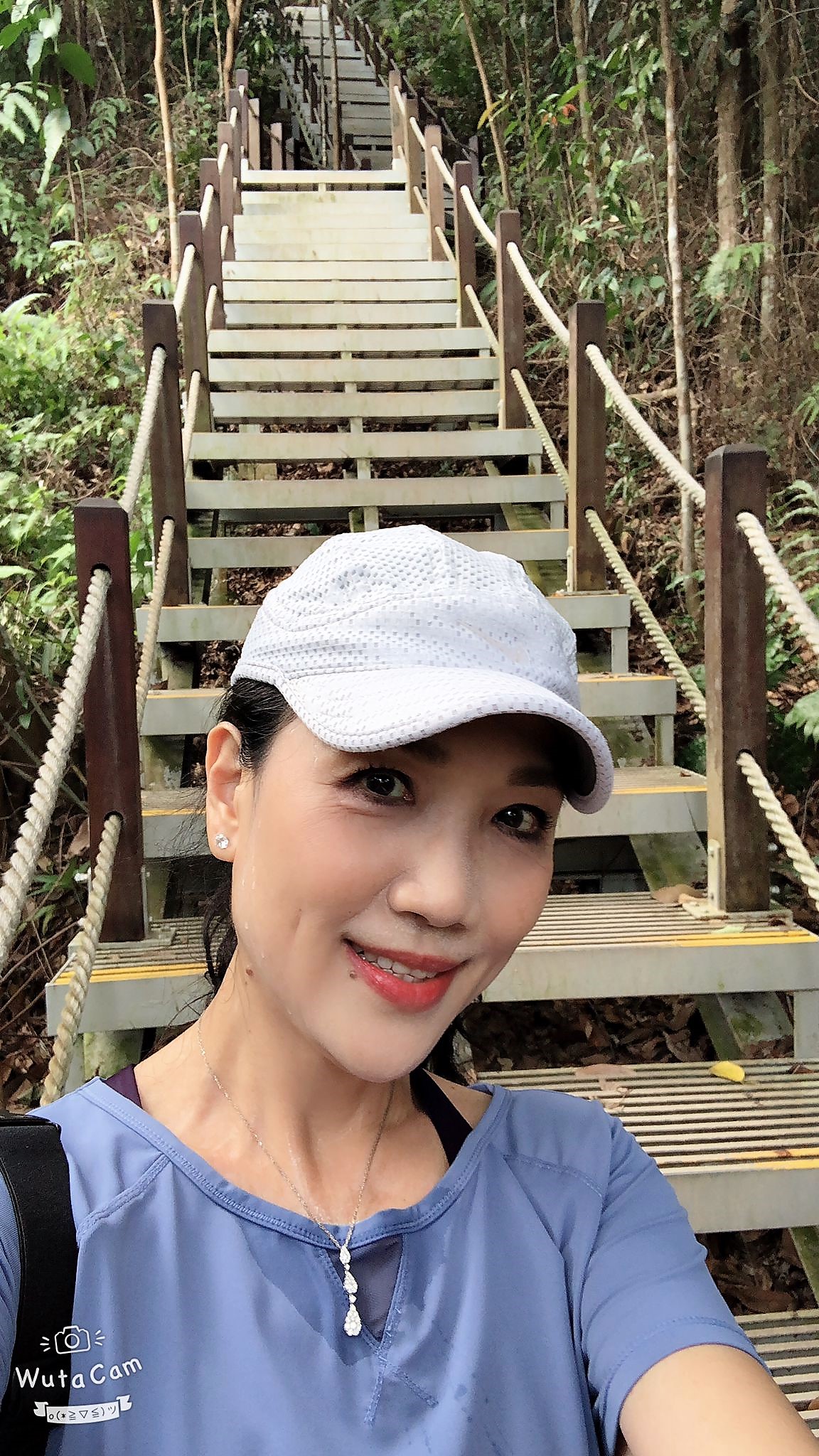
Cally believes in keeping fit. She regularly does High-intensity Interval Training (HIIT).
Cally also counsels the women. She tells them to reflect on their lives, encouraging them to keeps two journals: A medical one to record treatments, side effects and questions for the doctor; and one to give vent to their feelings.
“Think deep, reflect to become aware. We don’t like it because it is painful, it takes a lot of energy.
“If they are Christians, I tell them, ‘God wants us to be transformed to be more and more like Him. What needs to change, God will tell you.’”
Often, she tells them about the love of God and prays with them.
“They ask, ‘How do you do it?’ I tell them that God has been with me. I share how God has changed me from bad tempered and super impatient, to now I can talk to you for hours and hours. I can spend hours with someone.
“Then I ask, ‘Would you want to have the same God?’ I want to carry the Gospel where I go. I want to glorify Him in everything I do.”
“God gave me a lot of creativity to journey with the ladies.”
The journeys with the women vary in length. With some, Cally walks for a few weeks or even a few months. With others, the journey has lasted up to a decade. Often, death is their travel companion.
“I have to bring up the topic of death with the ladies. Then, I tell them, ‘Don’t focus on whether you will get healed but focus on how you will live every day.’
“No one challenges me on that. I have walked this journey.”
Much of how Cally deals with the women comes from her own personal experiences because there was little formal training for befrienders like her when she first started out.
The rest are gleaned from coaching and counselling skills acquired at work, as well as lessons learnt from volunteering at healing rooms in church.
Over time, she even developed her own help list for those newly diagnosed with breast cancer.
“God gave me a lot of creativity to journey with the ladies. I walked through all those points myself, especially the part about mental well-being.
“Everyone thinks about diet and exercise but forgets about mental well-being.”
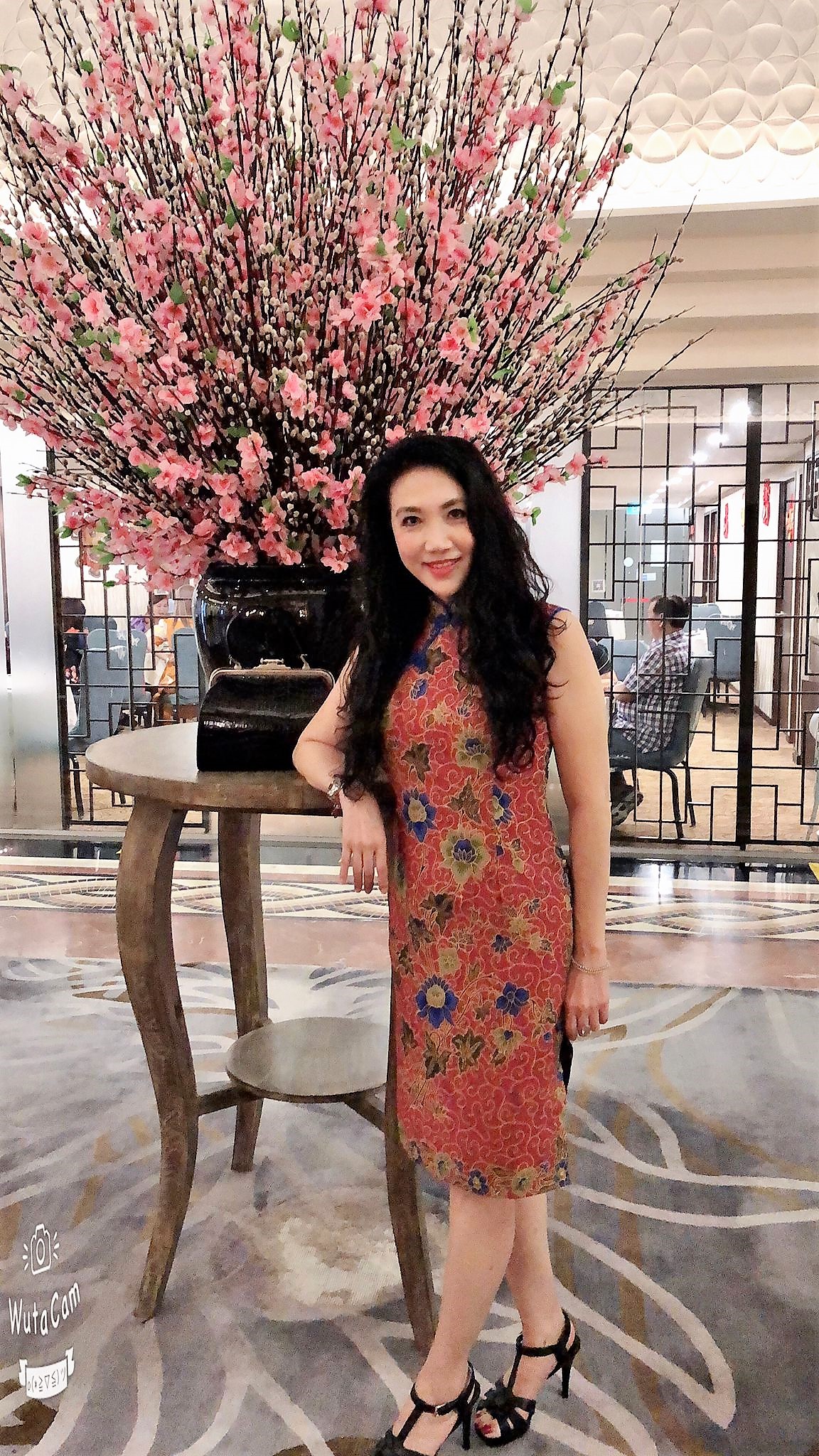
Cally made this cheongsam after attending sewing classes organised by the Breast Cancer Foundation.
After 23 years, Cally has become a familiar figure amongst breast cancer patients and survivors, having given many talks and interviews.
“Now, people know I am a survivor and that I have a passion to help these ladies. So they find me through social media. I am on different chat groups.
“Or other cancer survivors will refer people to me.”
She reckons she speaks to about 10 people every week, some from as far as Australia, India and the US, as well as parts of Asia.
Mission in the marketplace
Walking with women with breast cancer has not been the only mission God has given Cally.
After 12 years as a headhunter, the company closed down and Cally was prepared to take things easy.
“I went to a church camp and God told me to go back to work. I told God I didn’t want to be a headhunter anymore and I wanted to work in a global company.”
Soon after, a family friend offered her a job at an MNC. Cally is sure it was God’s providence.
“God slowed me down. By then, it was all about His ministry.”
“I was 40-something then. To join an MNC then was not possible. It was really divine intervention. The timing, everything, was just right.”
Cally’s new job would take her to China, a move she calls “a leap of faith” because she knew no one there.
“I was quite lonely for the first four weeks. I asked God, ‘Why did you bring me here? I am suffering here.’ He told me, ‘You have to do something.’”
Cally did indeed do something in her year in China. She started a company prayer meeting.
“Why God opened the door for me in the company was because it was meant to be a marketplace ministry.
“By then, I was very different from my ambitious headhunting days. God slowed me down. It was all about His ministry.”
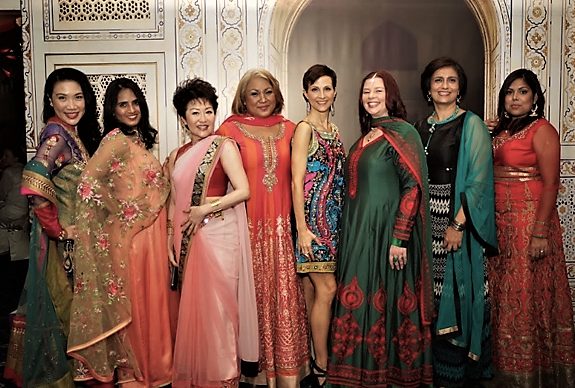
Cally (left) at a Breast Cancer Foundation fundraiser. Now retired, she devotes herself to supporting cancer patients and survivors.
She would return to Singapore to start a workplace prayer meeting as well. That became her primary focus in the company.
“I would pray, ‘God, I love to evangelise. If I work so hard, I would have no time to evangelise. So, help me to be effective. Help me to close deals so I have more time to evangelise.’
“For me to have this healing, and live the way I am now, is truly by the grace and mercy of God.”
“God honoured my desires. I had fewer deals but I always closed them all.”
That one prayer meeting soon inspired other prayer meetings in the company’s offices in Asia.
Cally has since retired and now spends her days supporting those with breast cancer.
“As I bless others, God has been blessing me.”
She was recently offered a small retainer by a doctor to journey with breast cancer patients.
“I was surprised. Pay me to do this? I said, ‘God, you are really good.’
“For me to have this healing, and live the way I am now, is truly by the grace and mercy of God.”
MORE STORIES ON THOSE SUFFERING FROM CANCER:
How one woman’s cancer diagnosis uncorked a torrent of songs and a musical of comfort and love
Cally's Guide for Newly Diagnosed Cancer Patients
Decision:
➢ Take your time to choose your doctor.
➢ Look into your finances, support from home, work etc.
➢ Take one day at a time.
➢ Focus on what is important and make decisions based on them e.g. lumpectomy or mastectomy, private or government hospitals etc.
➢ Make decisions and look ahead knowing that is the best decision, do not look back in regret (as you cannot do anything about it).
Mental Wellness:
➢ Talk to someone about it, do not journey alone e.g. speak to a befriender or a cancer coach.
➢ Connect regularly with people who have positive energy.
➢ Allow others to help you and do not feel you need to be independent or think you must be strong.
➢ Receive what others want to give to you or get help from them. This is not your weakness. You can pay it forward in the future.
➢ Set milestones and celebrate each small victory.
➢ Do and eat things that make you happy.
➢ Exercise regularly and drink lots of fluids.
➢ Listen to your body.
➢ Join a support group of ladies who are going through treatment to share your experiences or ask any questions to get and give support.
➢ Journal so that you can reflect on what you are going through, become aware, learn and find solutions.
➢ Focus on the good things you already have and not just on negative things. You are a victor and not a victim.
➢ Have a heart of gratitude. Be thankful for small things.
➢ Focus on building your mental strength e.g. read, listen to podcasts or watch videos that help rather than just reading only about cancer.
➢ Learn something new e.g. better parenting skills, new ways of exercising like HIIT, new eating habits, how to make better decision etc instead of reading all about cancer.
We are an independent, non-profit organisation that relies on the generosity of our readers, such as yourself, to continue serving the kingdom. Every dollar donated goes directly back into our editorial coverage.
Would you consider partnering with us in our kingdom work by supporting us financially, either as a one-off donation, or a recurring pledge?
Support Salt&Light

